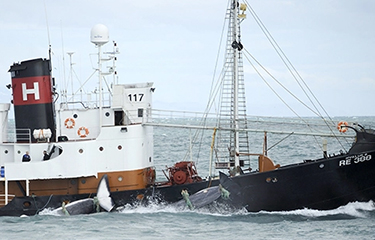Iceland’s government has suspended its sanctioning of whale hunting, and has said a permanent ban is under consideration.
Iceland Minister of Food, Agriculture and Fisheries Svandís Svavarsdóttir issued a directive on 20 June postponing the country’s whaling season until 31 August, 2023, after concluding the commercial killing of whales does not comply with Iceland’s Animal Welfare Act. The decision came following the release of a government panel released a study that found the hunting conducted by Hvalur, Iceland’s sole remaining company involved in the practice, did not kill whales fast enough so they did not suffer or feel pain.
I have made the decision to temporarily stop whaling in light of the unequivocal opinion of the professional council on animal welfare,” Svavarsdóttir said in a statement. “The conditions of the law on animal welfare are inescapable in my mind, if the government and license holders cannot guarantee welfare requirements, this activity does not see a future.”
Hvalur hunts both fin whales and minke whales, but its license to hunt fin whales expires later this year and it is unlikely to send whale-hunting vessels out in the small window available to it in early September, according to Mongabay. A second company ceased hunting whales in 2020 after deeming it no longer profitable.
Environmental groups, including the Humane Society International and the Animal Welfare Institute, said the move was a major milestone in the protection of marine mammals.
“There is no humane way to kill a whale at sea, and so we urge the minister to make this a permanent ban,” Humane Society International Executive Director for Europe Ruud Tombrock said in a statement. “Whales already face so many serious threats in the oceans from pollution, climate change, entanglement in fish nets and ship strikes, that ending cruel commercial whaling is the only ethical conclusion.”
AWI Marine Life Consultant Kate O’Connell noted video footage taken onboard Hvalur vessels showed 41 percent of the 148 fin whales killed in 2022 did not die immediately, and that 11 were pregnant and one was lactating.
“This is good news for Iceland’s whales, and we thank Minister Svavarsdóttir for her decision to halt the 2023 whaling season before it began, sparing dozens of majestic fin whales a cruel and prolonged death,” O’Connell said. “We will continue to advocate an end to all commercial whaling, an industry that is cruel and unnecessary, as well as illogical, given the enormous benefits that living whales provide to the health of ocean ecosystems and local coastal communities.”
Hvalur CEO Kristján Loftsson, who also the company’s largest shareholder, is also the leading shareholder of Reykjavik, Iceland-based fisheries and aquaculture equipment firm Hampiðjan Group, holding 36.6 percent of the company’s shares. Hampiðjan acquired fellow fisheries and aquaculture equipment firm Mørenot Group in December 2022 and began trading on the Nasdaq Iceland Main Market on 9 June.
Whaling has been a part of Iceland’s commercial fisheries industry for hundreds of years, but recently public opinion on the practice has shifted in the country, with a majority of the population now opposed, according to a 3 June survey conducted by the Maskina Institute.
Sea Shepherd U.K. Head Robert Read said Iceland’s findings should provide sufficient evidence to the two remaining nations allowing commercial whaling – Japan and Norway – that the practice should be banned. Japan is by far the world’s largest consumer of whale meat, and its commercial fleet resumed whaling in 2019, reducing demand for whale meat imported from Iceland.
“If whaling can’t be done humanely here … it can’t be done humanely anywhere,” Read told The Guardian.
Photo courtesy of Animal Welfare Institute







